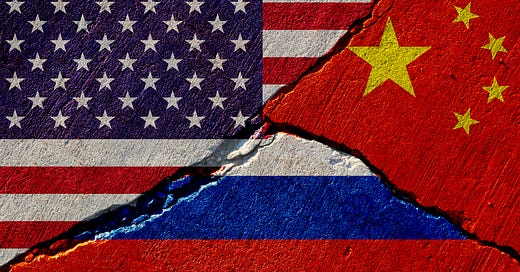Why is Trump giving away gifts to China for free?
Transactional Trump always demands something in return, but not for eliminating tools of American soft power and influence. Why?
Donald Trump is a transactional person. His governing style, as his business approach, is to never give anything away for free, to always get something in return. For this is praised by his supporters as a “master negotiator.” White House image makers call him the “Dealmaker-in-Chief.”
So why is President Trump giving gifts to the Chinese Communist Party for free?
Since re-taking office, the Trump Administration has taken a number of actions that redound to the benefit of the People’s Republic of China (PRC) within the framework of competition between the United States and the PRC.
The list of “gifts to China” is long. I covered many in The GOP’s gifts to the CCP: a list: elimination of the U.S. Agency for International Development and the Woodrow Wilson Center, seeking to eliminate the National Endowment for Democracy, Radio Free Asia and Voice of America (which hang on for now due to litigation).
I recommend Chinese Activists Are in Shock over Cuts to U.S. Human Rights Programs by Thomas Kellogg in ChinaFile, which discussed how the Trump Administration’s cuts hurt our ability to get and analyze information from inside China, reach those in China, and advocate for human rights and rule of law in China. Scott Busby and Cob Blaha, in Just Security, write How the Proposed State Department Reorganization Guts U.S. Human Rights Diplomacy, showing how Secretary Marco Rubio’s plan is “especially damaging to attempts to advance human rights in China.”
Beyond foreign aid, there are many other Trump actions that analysts and academics see as helping the influence and interest of the CCP: domestic deployment of the military to suppress critics, shambolic tariff policy that make China appear as a stable economic actor, the crackdowns on foreign students and domestic universities. I could go on.
All of these actions have been, evidently, voluntary and unilateral. Meaning, that the United States is not getting anything in return for these gifts.
Intentional or not, the Trump Administration has functionally revived the discredited “strategic reassurance” approach of the Bush and Obama Administrations, which offered up-front concessions from China in the expectation that Chinese leaders would respond in kind to U.S. interests, such as global cooperation on economic stability and climate change, or regional security assurances. This approach failed because, as we saw, Chinese leaders pocketed the concessions and did whatever the hell they wanted anyway.
Ironically, it was Trump 1.0 that closed the door on “strategic reassurance.” And I praised his Administration for doing it. But on China, Trump 2.0 is so unlike his first term.
Why? And what does this mean?
Maybe it’s nothing more than a product of the arbitrariness and illogic of Trump’s style. Remember, this is a man who bases his tariff policy on a belief that if an American pays money in exchange for a product that is produced in China, it represents China stealing money from America. This is nuts, of course, but he has entire teams of staffers who have to act as if it’s logical. Maybe the gifts to the CCP are the result of the same disorder. And yet…
It shows that the people running the show are NOT the same. Trump 1.0 was dominated by New Cold Warrior-types like Mike Pompeo and Mike Pottinger. Trump 2.0 has sidelined and silenced this faction, as I wrote in The New Cold Warriors are failing. Mike Waltz was fired and Marco Rubio is dedicatedly obsequious. The deconstructionists – Stephen Miller, Project 2025, Elon Musk and his DOGE legacy – are paramount. Ending the pillars of American soft power suit their agenda (and economic self-interest).
Lastly, we have to consider that the gifts to the CCP are part of a plan. Maybe there is truth in the idea that President Trump has a vision of a three-power arrangement where the United States, China and Russia each dominate their sphere of influence. It is easy to imagine the appeal to Trump in this; he sees Putin and Xi as kin – strongmen who value power, authority and unquestioned loyalty, who see things like democracy, pluralism and dissent as weaknesses to be swept aside or crushed.
Put these last two points together, and you start to see that the “gifts to the CCP” make intellectual sense. Because they aren’t gifts. They aren’t being given away. Rather, they are no longer needed, no longer part of the program. Soft power becomes dispensable when only hard power is valued. The notion of building up goodwill by helping those in need, the emphasis on things like collaboration, partnership and shared values – well, those things are for pussies.
If you consider that what Trump is doing is reordering U.S. foreign policy to put the country in authoritarian alignment the with big states run by men with whom Trump bonds personally, then the deconstruction make perfect sense. It’s not just that USAID, RFA, VOA, NED are irritants to the governments of China and Russia. More essentially, it’s that the mission of those organizations is fundamentally at odds with core principles of Trump and his movement, and his vision for how governance should be structured, domestically and globally.
Of course, I strongly believe in what these organizations are doing and vehemently oppose Trump’s attempt to eliminate them. The effort to save them involves both legal actions and tactical arguments in appeals to Congress. But we cannot not ignore the deeper motivations for why Trump is doing it, and all of the implications they reveal, and the need to counter it on a more fundamental level.



